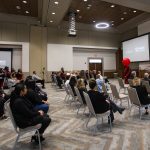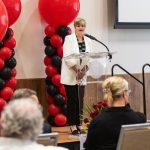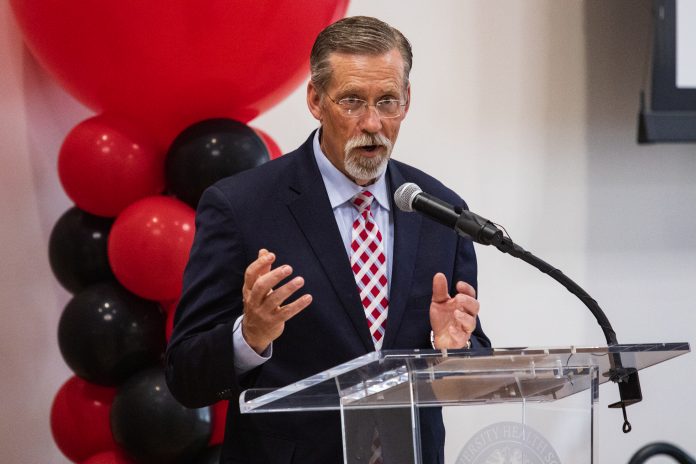
Top executives from regional healthcare providers came together with the Permian Strategic Partnership Monday to celebrate funding that will bring a rural surgical and sub-specialty training program to the Permian Basin.
The announcement was made at the Texas Tech University Health Sciences Center Academic Building. The initiative includes $12.8 million from the Permian Strategic Partnership and $1.7 million through the legislature and Rep. Tom Craddick, R-Midland.
Dr. Timothy Benton, regional dean of the Texas Tech University Health Sciences School of Medicine in Odessa said the program is set to start in July.
New cardiology and gastroenterology residencies, along with Tech’s existing endocrinology residency, will create a pathway to a critical care fellowship.
Dr. Shelton Viney, chair of the Department of Surgery, said between Odessa and Midland, more than 12,000 major surgical procedures that are under the general and vascular realm are performed.
“That’s a tremendous amount of cases — a lot more than a lot of universities and we didn’t have a surgical residency,” Viney said.
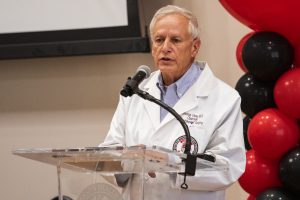
Benton said there will be six residents.
“Surgery is a five-year training program. They’ll bring two in the first year, two that are already ready to be second years and two in the third year and so we’ll get two in each class for six,” Benton said.
“Each year you match more into the program as first years and then they just continue to move through all five years,” he added.
Benton said it could potentially expand.
“There’s always opportunity depending on the need in the community that we could expand the program,” he added.
Residency programs are open to students that apply from anywhere around the region or the nation, Benton said.
During his remarks, Benton said a regional healthcare assessment recently conducted by Chartis Group showed that 27 percent of care goes outside of the Permian Basin.
As time goes on, it’s hoped that the program will sustain the region and healthcare delivery and sustain the growth of the community, Benton said.
Texas Tech University Health Sciences President Lori Rice-Spearman said Viney was instrumental in bringing the initiative to fruition.
“We’re here today because of you,” Rice-Spearman said.
MCH President and CEO Russell Tippin said as a CEO of smaller hospitals in teh region, he knows how important programs like this are to the Basin. Tippin added that the area served by MCH and MMH covers 48,000 square miles.
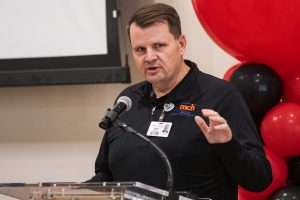
“That includes the smallest county in Texas, which is Loving County, and also the largest county in Texas, which is Brewster County,” Tippin said.
People travel from as far away as Del Rio and Van Horn to get healthcare in this region.
“These people rely on us and what we do and how we provide care and now we’re going to be able to advance that care and to make sure that what’s most important is that we leave things better than we found them …,” Tippin said.
Rice-Spearman said Monday’s celebration recognizes the largest single gift to the Tech campus — “a transformative gift that will allow us to expand access and advanced healthcare for those living in the Permian Basin and Eastern New Mexico.”
PSP President and CEO Tracee Bentley said access to quality, affordable health care on a regional basis remains a top priority for the Permian Strategic Partnership.
“Along with other community leaders, we took a hard look at the region’s health care needs. And specialty sub-specialty physicians, including general surgeons, cardiologists, gastroenterologists and critical care physicians are obvious needs for our entire region. We strongly believe that the grow your own approach gives us a great opportunity for those physicians to stay right here in the Permian; to live and work and to raise their families. Retention of physicians is vital and residency programs can attract more physicians to the areas where they are located and help aid in retention. National statistics indicate that up to 60% of trained residents will remain within a 50-mile radius of the region in which they serve to residency to establish their medical practice. In supporting this program, PSP seeks to strengthen the physician pipeline for our region’s hospitals and clinics, which already have strong relationships with TTUHSC,” Bentley said.
“We want to make sure that our top healthcare leaders like Russell Tippin, and like Russell Meyers and all of our rural hospital CEOs out there have the talent that they need to take good care of us and our community. And this is a big step towards that …,” she added.
Craddick noted that if the area doesn’t have the people to provide medical care, they’re not going to come here.
“We’ve found that through the years. We had a hard time getting medical professionals, and not just surgical but all walks of the medical profession, to move out here, bring their families and to live here and grow with the community. This will be a major way to get it done,” Craddick said.

